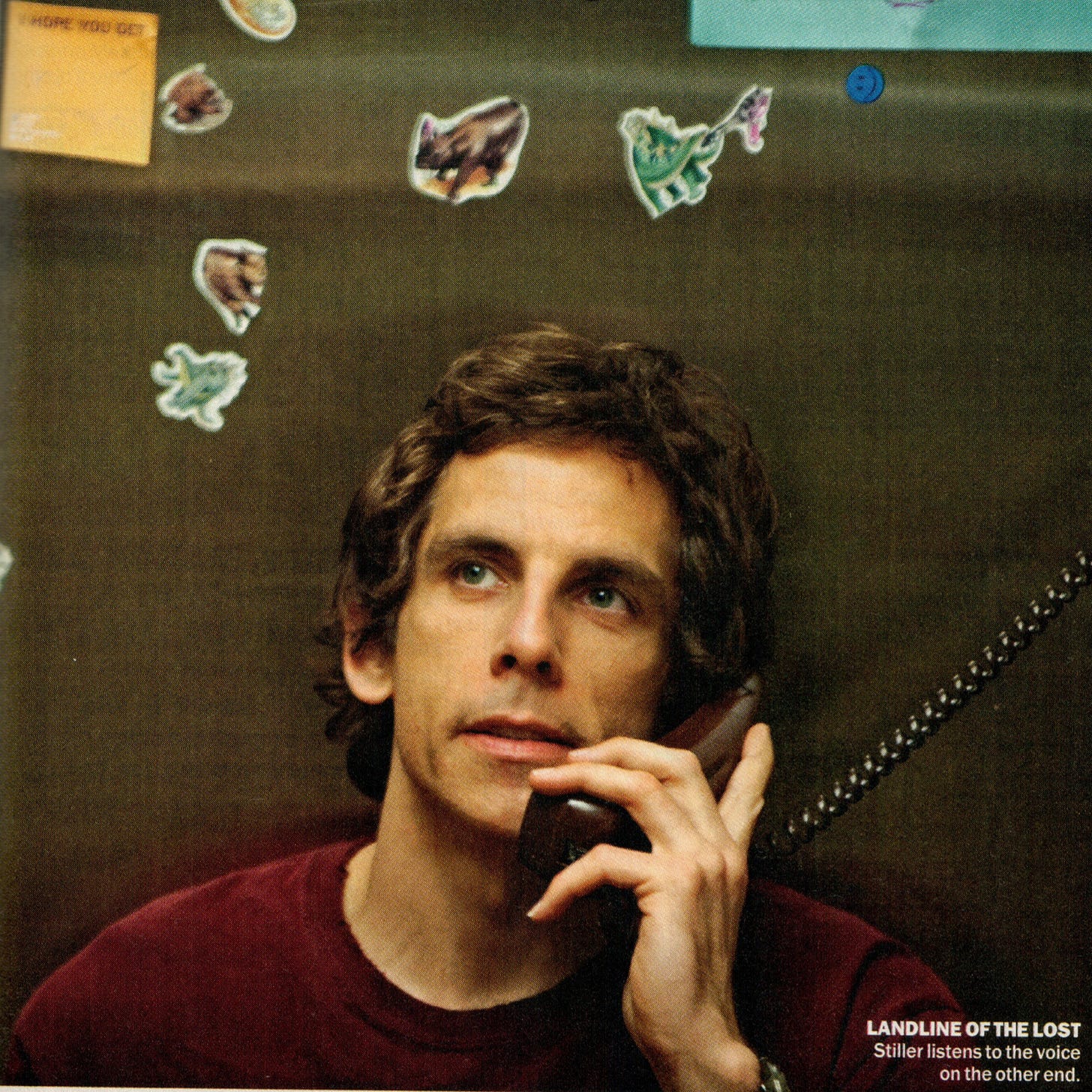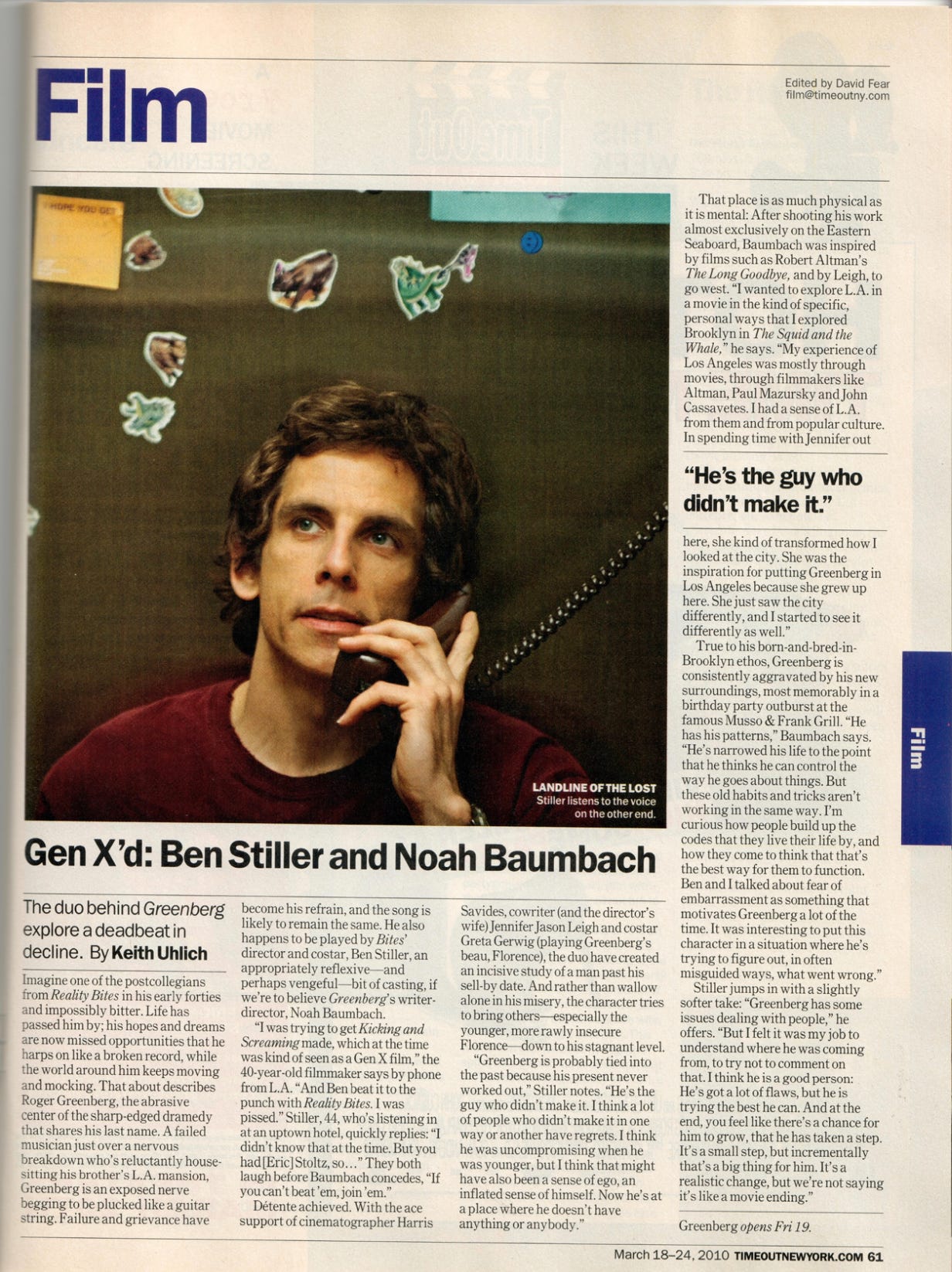Gen X'd: Ben Stiller and Noah Baumbach
Time Out New York Project: Issue #755, March 18–24, 2010
The duo behind Greenberg explore a deadbeat in decline. By Keith Uhlich
Imagine one of the postcollegians from Reality Bites in his early forties and impossibly bitter. Life has passed him by; his hopes and dreams are now missed opportunities that he harps on like a broken record, while the world around him keeps moving and mocking. That about describes Roger Greenberg, the abrasive center of the sharp-edged dramedy that shares his last name. A failed musician just over a nervous breakdown who’s reluctantly house-sitting his brother’s L.A. mansion, Greenberg is an exposed nerve begging to be plucked like a guitar string. Failure and grievance have become his refrain, and the song is likely to remain the same. He also happens to be played by Bites’ director and costar, Ben Stiller, an appropriately reflexive — and perhaps vengeful — bit of casting, if we’re to believe Greenberg’s writer-director, Noah Baumbach.
“I was trying to get Kicking and Screaming made, which at the time was kind of seen as a Gen X film,” the 40-year-old filmmaker says by phone from L.A. “And Ben beat it to the punch with Reality Bites. I was pissed.” Stiller, 44, who’s listening in at an uptown hotel, quickly replies, “I didn’t know that at the time. But you had [Eric] Stoltz, so…” They both laugh before Baumbach concedes, “If you can’t beat ’em, join ’em.”
Détente achieved. With the ace support of cinematographer Harris Savides, cowriter (and the director’s wife) Jennifer Jason Leigh and costar Greta Gerwig (playing Greenberg’s beau, Florence), the duo have created an incisive study of a man past his sell-by date. And rather than wallow alone in his misery, the character tries to bring others — especially the younger, more rawly insecure Florence — down to his stagnant level.
“Greenberg is probably tied into the past because his present has never worked out,” Stiller notes. “He’s the guy who didn’t make it. I think a lot of people who didn’t make it in one way or another have regrets. I think he was uncompromising when he was younger, but I think that might have also been a sense of ego, an inflated sense of himself. Now he’s at a place where he doesn’t have anything or anybody.”
That place is as much physical as it is mental: After shooting his work almost exclusively on the Eastern Seaboard, Baumbach was inspired by films such as Robert Altman’s The Long Goodbye, and by Leigh, to go west. “I wanted to explore L.A. in a movie in the kind of specific, personal ways that I explored Brooklyn in The Squid and the Whale,” he says. “My experience of Los Angeles was mostly through movies, through filmmakers like Altman, Paul Mazursky and John Cassavetes. I had a sense of L.A. from them and from popular culture. In spending time with Jennifer out here, she kind of transformed how I looked at the city. She was the inspiration for putting Greenberg in L.A. because she grew up here. She just saw the city differently, and I started to see it differently as well.”
True to his born-and-bred-in-Brooklyn ethos, Greenberg distress is consistently aggravated by his new surroundings, most memorably in a birthday party outburst at the famous Musso & Frank Grill. “He has his patterns,” Baumbach says. “He’s narrowed his life to the point that he thinks he can control the way he goes about things. But these old habits and tricks aren’t working in the same way. I’m curious how people build up the codes that they live their life by, and how they come to think that that’s the best way for them to function. Ben and I talked about fear of embarrassment as something that motivates Greenberg a lot of the time. It was interesting to put this character in a situation where he’s trying to figure out, in often misguided ways, what went wrong.”
Stiller jumps in with a slightly softer take: “Greenberg has some issues dealing with people,” he offers. “But I felt it was my job to understand where he was coming from, to try not to comment on that. I think he is a good person. He’s got a lot of flaws, but he is trying the best he can. And at the end, you feel like there’s a chance for him to grow, that he has taken a step. It’s a small step, but incrementally that’s a big thing for him. It’s a realistic change, but we’re not saying it’s like a movie ending.”





